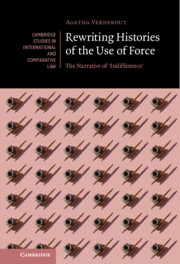Book contents
- Rewriting Histories of the Use of Force
- Cambridge Studies in International and Comparative Law: 160
- Rewriting Histories of the Use of Force
- Copyright page
- Contents
- Foreword
- Acknowledgements
- Abbreviations
- Introduction
- Part I The Use of Force in Nineteenth-Century Doctrine
- 1 The ‘Use of Force’ in the Nineteenth Century
- 2 The Use of Force in Writings of ‘Naturalist’ Inclination
- 3 The Use of Force in Writings of ‘Eclectic’ Inclination
- 4 The Use of Force in Writings of ‘Positivistic’ Inclination
- Conclusion of Part I
- Part II The Use of Force in Nineteenth-Century Practice
- Part III The Narrative of Indifference in the Twentieth Century
- Conclusion
- Bibliography
- Index
- Cambridge Studies in International and Comparative Law
4 - The Use of Force in Writings of ‘Positivistic’ Inclination
from Part I - The Use of Force in Nineteenth-Century Doctrine
Published online by Cambridge University Press: 10 September 2021
- Rewriting Histories of the Use of Force
- Cambridge Studies in International and Comparative Law: 160
- Rewriting Histories of the Use of Force
- Copyright page
- Contents
- Foreword
- Acknowledgements
- Abbreviations
- Introduction
- Part I The Use of Force in Nineteenth-Century Doctrine
- 1 The ‘Use of Force’ in the Nineteenth Century
- 2 The Use of Force in Writings of ‘Naturalist’ Inclination
- 3 The Use of Force in Writings of ‘Eclectic’ Inclination
- 4 The Use of Force in Writings of ‘Positivistic’ Inclination
- Conclusion of Part I
- Part II The Use of Force in Nineteenth-Century Practice
- Part III The Narrative of Indifference in the Twentieth Century
- Conclusion
- Bibliography
- Index
- Cambridge Studies in International and Comparative Law
Summary
This chapter is the third and last one dedicated to the analysis of nineteenth-century doctrine. It focuses on ‘positivist’ literature and follows the same structure as the two previous chapters. It starts by evidencing how ‘positivist’ construed that international legal order. It shows how they kept but ‘positivized’ many naturalist premises, such as the principle of independence, equality and self-preservation. When it came to custom identification and determination, ‘positivist’ firmly advocated a ‘historical’ method. Consequently, when analysing the rules of intervention, positivist authors engaged in a much more thorough analysis of State practice than their colleagues. Notwithstanding, this stillled them to conclude that non-intervention was the rule, and that instances of uses of armed force where the application of exceptions to this rule. Thus, even nineteenth-century ‘positivists’, who we today tend to portray as ‘neo-Hegelians’, believed the use of force was not an unrestricted prerogative of States.
Keywords
- Type
- Chapter
- Information
- Rewriting Histories of the Use of ForceThe Narrative of ‘Indifference', pp. 78 - 106Publisher: Cambridge University PressPrint publication year: 2021

